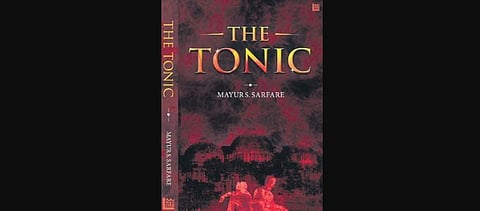

Write what you know is a piece of advice often given to budding writers; Mayur Sarfare took that advice and set out on a journey with his work. His debut novel The Tonic has recently been published by Leadstart Publishing Pvt. Ltd. It took six long years for Mayur to complete this labour of love. The theme of the book revolves around atheism at a philosophical level and its impact on the major characters in a world ravaged by religious fanaticism.
Excerpts from an interview:
Could you please tell us the journey of your book, from inception to publication?
The journey began with a powerful idea striking during a bus ride. There was this initial dilemma whether to turn it into a movie script or novel, in fact, I had spent first few months writing it as a script, but then I realised that the idea required greater depth that a script won’t be able to contain. A novel would allow for my literary skills to be expressed. Once I got done with the writing part, a decent amount of time went into structuring the chronology of events since the novel has a non-linear narrative. And after the novel was ready to be read, I had the sample chapters and the synopsis mailed to various publishing houses, out of which very few responded as I was a debutant. It was Leadstart that expressed interest in my work, subsequently I sent the whole manuscript, which later was approved and the novel was published.
What made you choose the themes you did?
My journey from being an agnostic to an atheist was a protracted one. In my early 20s, I was riveted by the perspectives offered towards the perniciousness of religion from the great atheists of our time — Richard Dawkins, Sam Harris and Christopher Hitchens. It is at this point that an idea of a novel engendered in my head, and very organically wrapped itself around the philosophical idea of atheism. The ‘emboldening of mind’ was another primary theme that married itself with that of atheism. Also, the fact that there were very few Indian books that explored atheism as a serious theme motivated me to write one that addressed this idea in the heart of a fiction.
Given the current socio-political climate, were you worried of ruffling any conservative feathers?
When I began writing, UPA-II, it was a different country back then, as the saying goes “Past is a foreign country, they do things differently there”, the socio-political climate in 2013 was dramatically different, but I always wanted to write something that would shake the reader, make them ponder, and not pander to the comfortable notions they have about religion and society. There was always the distinct possibility (still is) of inciting the ones tending towards the right, but that never bothered me. I wanted to be as intellectually honest with my work as possible. The current socio-political climate will definitely be sensitive towards certain sections of the book.
Who are your literary and philosophical inspirations?
Victorian literature captivated me as a young reader. Jane Austen was one of my favourite authors during my late adolescence, her extensive use of abstract nouns deeply influenced my writing style. Salman Rushdie is another legendary author whose writing style and literary devices I took a liking to, especially ‘personification’ as a powerful figurative tool. If you talk about early philosophy, then it is Immanuel Kant, indubitably, his ‘critique of pure reason’ had me tearing my head during my adolescence, but as revisited them over time I realised what a counter-intuitive idea it was! In recent years, it has been Richard Dawkins who inspired me philosophically towards atheism and Sam Harris’ works on free will and consciousness has a profound effect on my intellect.
Are you already working on your next project or taking a breather?
Pitching the novel to OTT platforms houses has been taking up a lot of time as the reviews have overwhelmingly suggested the potentiality of an on-screen adaptation in the plot. The Covid-induced lockdown offered a lot of time in my hands, and the idea for the next novel had already taken birth in my head. I have half-completed my next novel, which is a romantic mystery and has a powerful setting with reallife incidents.